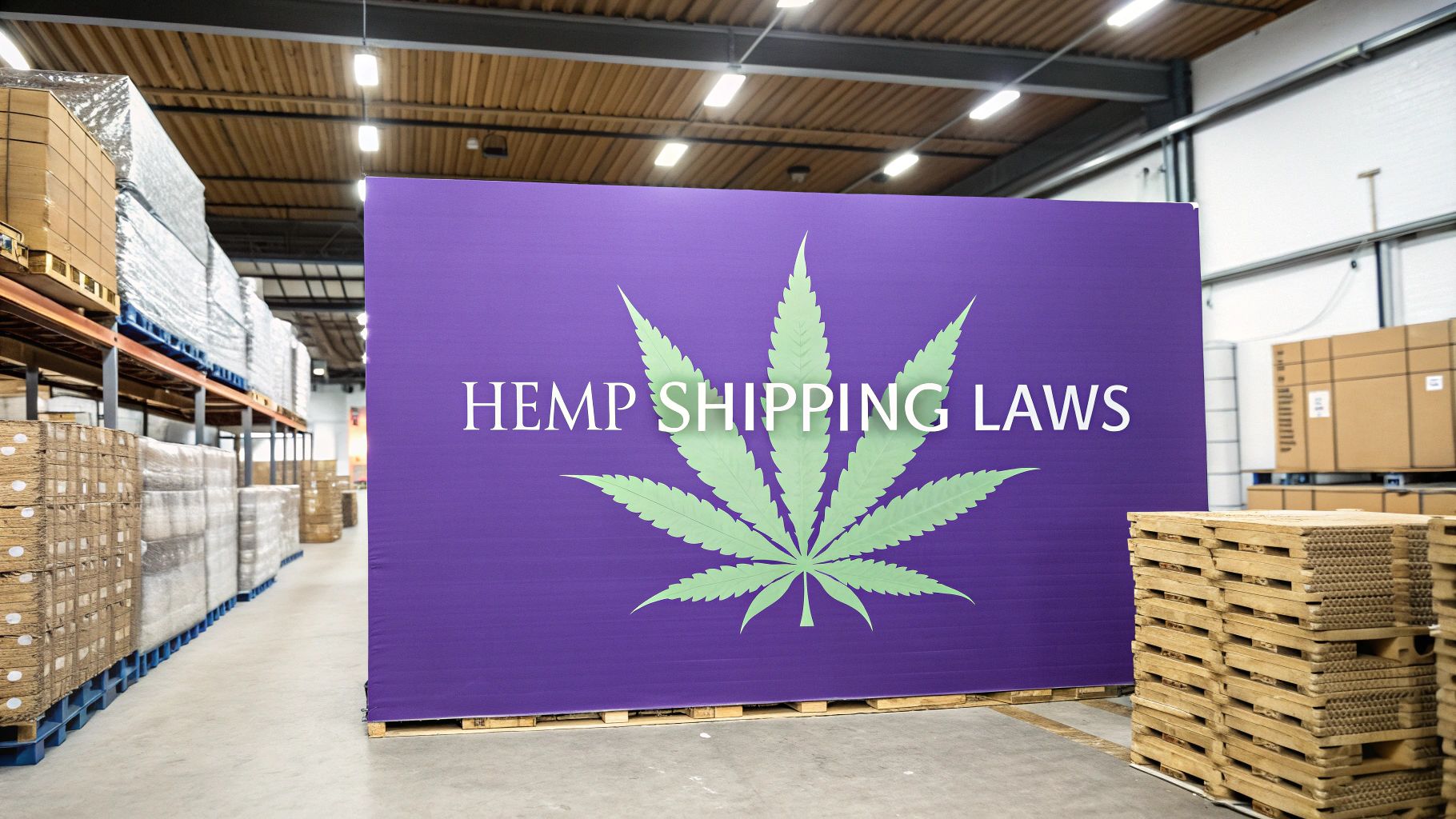
CBD/Hemp/THCA Shipping Laws California: Important Regulations
Learn everything about CBD/Hemp/THCA Shipping Laws California. Stay compliant with our guides on state and federal shipping regulations in California.
Cody Y.
Updated on Oct 8, 2025
Navigating California’s CBD, hemp, and THCA shipping laws can feel like trying to hit a moving target. The Golden State, once a wide-open market, has slammed the brakes on, putting some of the strictest controls in the country on hemp-derived products.
The new reality is simple: any hemp product that contains intoxicating cannabinoids—including THCA, which converts to THC when heated—is now illegal for general sale and shipping. These products must be sold exclusively through licensed cannabis dispensaries. This single change completely rewrites the rules for what you can and can't ship directly to consumers in California.
Understanding California's New Hemp Reality
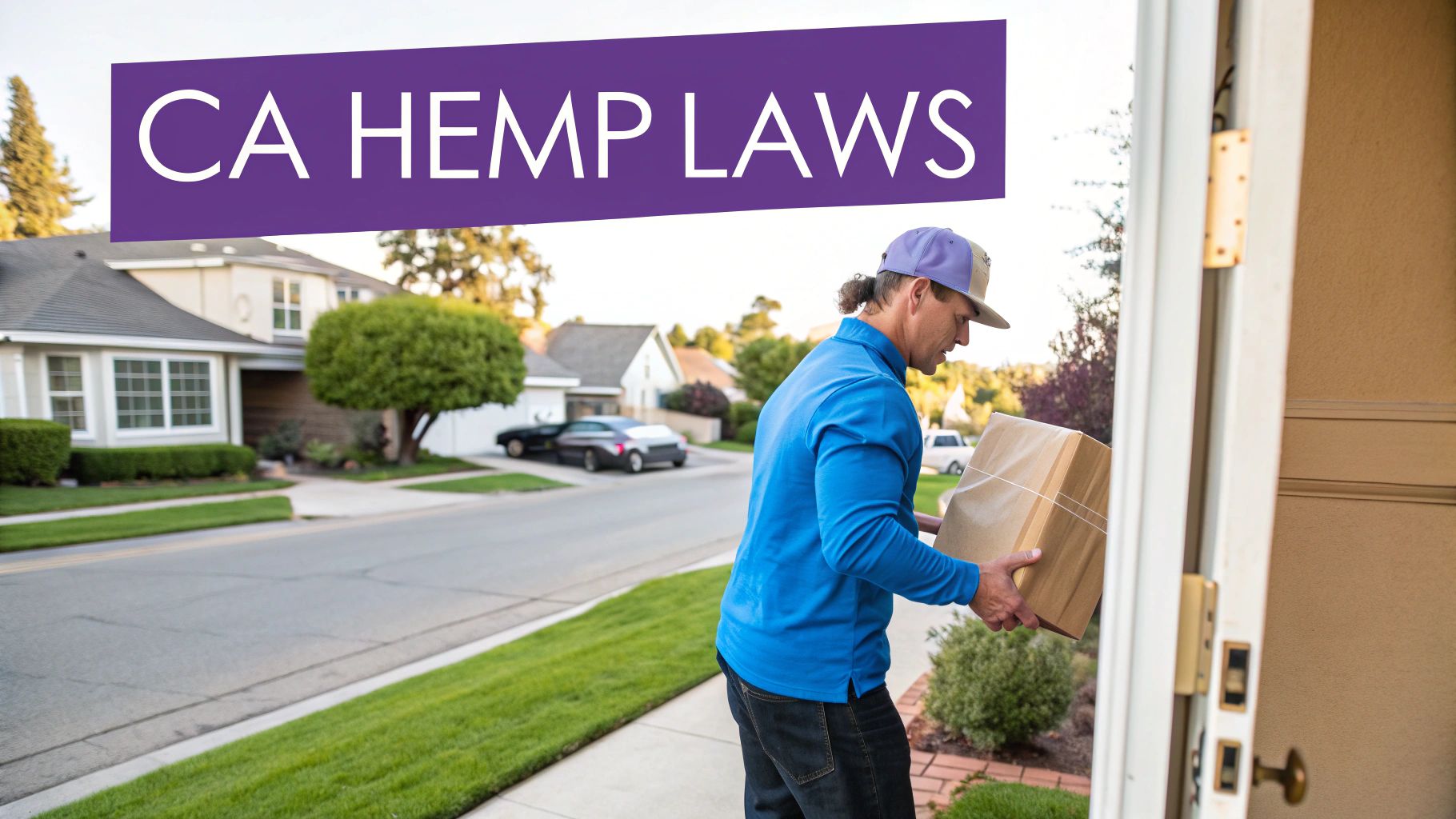
It wasn't long ago that California was the epicenter of the hemp boom. You could find CBD oils, hemp drinks, and all sorts of cannabinoid goodies in grocery stores, wellness shops, and even gas stations. While this free-for-all market fueled a massive economy, it also created a regulatory nightmare and serious consumer safety issues.
That landscape has changed dramatically. California swung from one of the most permissive markets to one of the most restrictive, all centered on a new legal dividing line: "intoxicating" versus "non-intoxicating" hemp.
The Great Divide: Intoxicating vs. Non-Intoxicating Hemp
This distinction is the single most important concept to grasp when it comes to California's CBD, Hemp, and THCA shipping laws. The state no longer cares only about the Delta-9 THC content—the federal benchmark from the 2018 Farm Bill. Instead, California now looks at "total THC," a calculation that includes both Delta-9 THC and the potential THC from THCA.
This is a game-changer for THCA products. A raw THCA flower might test below the 0.3% Delta-9 THC limit, making it federally legal hemp. But California's law recognizes a simple scientific fact: when you heat THCA, it becomes psychoactive Delta-9 THC. As a result, high-THCA products are now treated just like marijuana.
The bottom line is this: if a hemp product can get you high, it cannot be sold or shipped through general retail channels in California. It has to go through the state's licensed cannabis dispensary system, with all the taxes, testing, and regulations that come with it.
This sharp pivot was a direct response to a flood of health incidents tied to unregulated products. California's hemp industry, once a powerhouse with CBD sales hitting $730 million, found itself in the crosshairs. The California Department of Public Health (CDPH) issued emergency regulations banning the sale of hemp foods, drinks, or supplements with any detectable THC outside of licensed dispensaries.
A damning white paper fueled the fire, revealing that a shocking 95% of 104 tested hemp products contained chemically synthesized cannabinoids, not natural hemp extract.
What This Means for Your Business
If you're shipping hemp products into or within California, this new environment creates a minefield of compliance challenges. Federal compliance is no longer enough; you have to play by California's much stricter rules.
This shift directly impacts a huge range of popular products:
- THCA Flower and Vapes: These are now officially "intoxicating" and restricted to licensed dispensaries. Shipping them directly to a consumer's doorstep is a no-go.
- Delta-8 THC Products: As an intoxicating, synthetically-derived cannabinoid, Delta-8 is completely banned from the general retail market.
- Full-Spectrum CBD: Even products with trace amounts of THC can get flagged, especially if they're in food or beverage form.
For a quick reference, here's a breakdown of what's generally allowed versus what's restricted to the licensed cannabis channel.
California Hemp Product Status At a Glance
| Product Type | Permitted for General Retail & Shipping? | Key Restriction |
|---|---|---|
| THCA Flower & Pre-Rolls | No | Considered intoxicating due to conversion to THC upon heating. |
| Delta-8, Delta-10 THC | No | Classified as intoxicating and often synthetically derived. |
| HHC, THC-P, THC-O | No | All are considered intoxicating cannabinoids. |
| CBD Isolate Products (0.0% THC) | Yes | Permitted as long as they contain no detectable THC. |
| Broad-Spectrum CBD (Non-Detect THC) | Yes | Permitted as long as they are verified THC-free. |
| Full-Spectrum CBD (with >0.0% THC) | No | Banned from food, beverages, and supplements in general retail. |
| Hemp Seed Oil (non-cannabinoid) | Yes | Not a cannabinoid product; treated as a food ingredient. |
Understanding these fundamental rules is the first step. Before we get into the nitty-gritty of packaging, labeling, and carrier policies, it's critical to know what's even allowed to leave your warehouse. A solid grasp of the broader hemp shipping rules and restrictions starts with respecting this state-specific framework. The next sections will build on this, giving you practical strategies to stay compliant in one of the toughest markets in the country.
The Conflict Between Federal and California Law
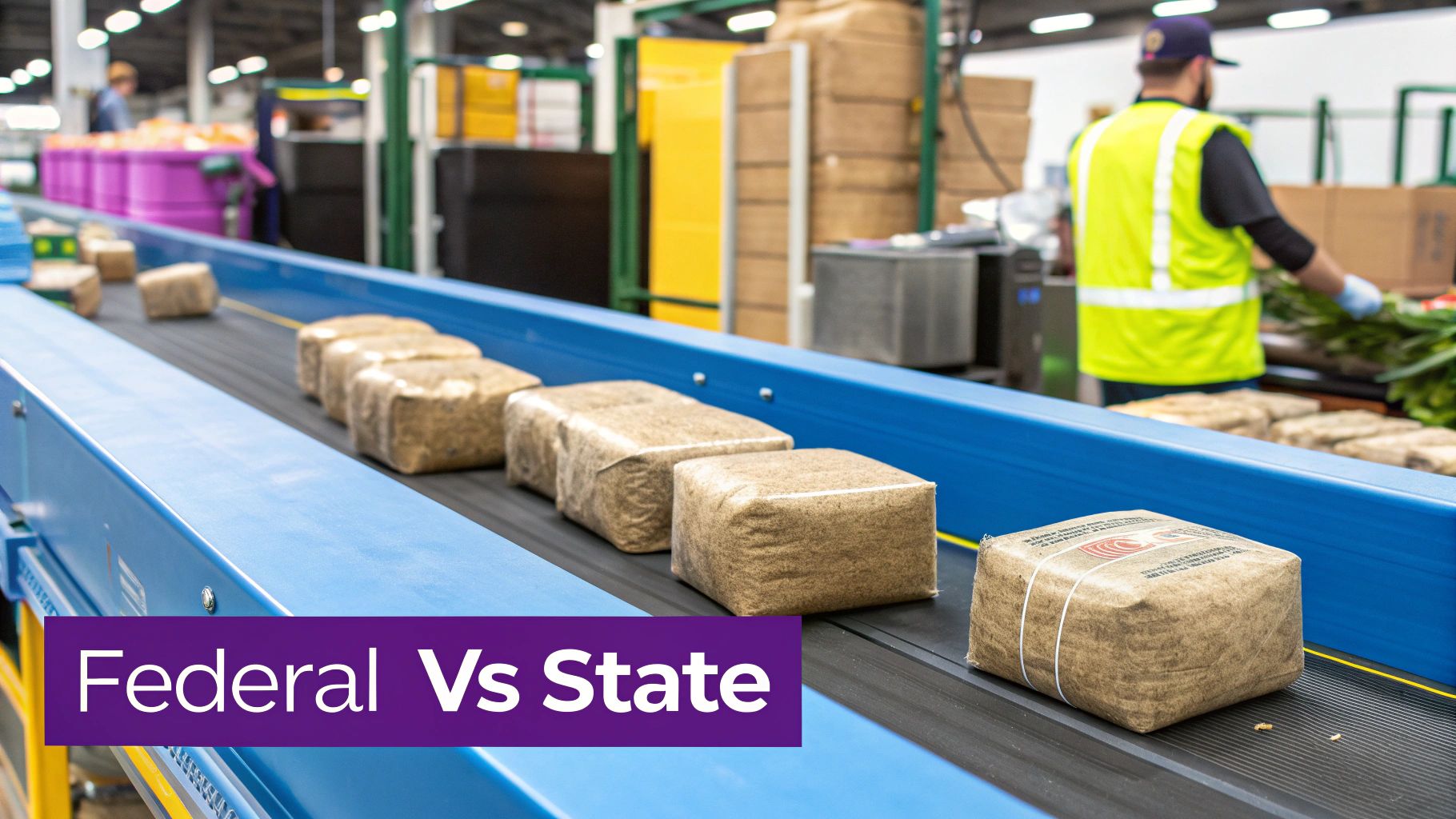
One of the biggest headaches for any business in the hemp space is the constant tug-of-war between federal and state law. Think of it like this: federal law sets the broad rules for the national highway system. California, however, is a dense city with its own strict, local traffic ordinances—and they are often much tougher than the highway patrol's.
This conflict creates a compliance minefield, especially for companies shipping products into the Golden State. A product can be perfectly legal on the federal highway but become instantly illegal the moment it takes a California off-ramp.
The Federal Green Light: The 2018 Farm Bill
The journey for legal hemp commerce kicked off with the 2018 Farm Bill. This landmark federal legislation was a game-changer, removing hemp from the Controlled Substances Act and effectively legalizing it nationwide.
The key distinction was simple: cannabis with less than 0.3% Delta-9 THC on a dry-weight basis was now "hemp." Just like that, it could be legally grown, processed, and shipped across state lines, opening the floodgates for the booming CBD and hemp markets we see today.
But the Farm Bill left a critical loophole. It only specified Delta-9 THC, leaving other cannabinoids like THCA in a murky gray area. This ambiguity is exactly where California’s stricter rules come into play, creating a major point of friction. For context, FDA rules heavily influence the federal approach, and a comprehensive guide to FDA regulations for dietary supplements can offer valuable insight.
California’s Local Roadblocks: AB 45 and Total THC
While the feds opened the highways, California built tollbooths and checkpoints. The state’s primary tool is Assembly Bill 45 (AB 45), which established a framework for hemp products but slammed down much tighter controls than its federal counterpart.
The most significant difference is California's laser focus on "total THC." This is a crucial concept to grasp.
California law requires calculating total THC by adding the Delta-9 THC content to the potential THC that can be converted from THCA (Delta-9 THC + 0.877 * THCA). This simple formula closes the federal loophole entirely.
This means a product that is federally compliant "hemp" can be instantly reclassified as illegal "cannabis" under California law if its total THC content is high. This legal distinction is vital, and understanding the core differences is essential. You can dive deeper into our detailed comparison of hemp vs. marijuana products and their critical shipping law differences to learn more.
The THCA Conundrum: A Perfect Example of the Conflict
The issue with THCA products perfectly illustrates this federal versus state clash. Let's walk through a real-world example of how CBD/Hemp/THCA shipping laws in California create a massive problem for sellers.
- Federal View: A business in Oregon has THCA flower that tests at 0.2% Delta-9 THC. Under the 2018 Farm Bill, this is 100% legal hemp. They believe they can legally ship it anywhere in the U.S.
- California View: That same flower has 20% THCA. When California regulators apply their "total THC" formula, the product is considered highly intoxicating and is legally classified as marijuana, not hemp.
- The Result: If the Oregon company ships this product to a customer in California, they are breaking state law. The package is subject to seizure, and the business faces significant penalties.
This disconnect is the central challenge for out-of-state companies. Federal compliance is merely the entry ticket; it doesn't guarantee you can legally operate in California. Every business must meet the state's more stringent definition of what constitutes a legal, non-intoxicating hemp product.
Mastering Intrastate and Interstate Shipping Logistics
Figuring out the logistics of moving hemp products in, out, and around California isn't something you can wing. It demands a precise, rules-based approach because the legal lines are drawn in permanent ink. One channel is for free and clear shipping; another is heavily restricted. Knowing the difference is what keeps your products from getting seized and your business out of legal trouble.
At the heart of it all is a simple split: business-to-business (B2B) versus direct-to-consumer (D2C) shipping. This isn't just about who you're selling to—in California, it determines what you can legally ship.
Shipping Within California (Intrastate)
When you're shipping from one California address to another, you only need to worry about one set of rules: the state’s. And they are strict. The deciding factors are the product's destination and its cannabinoid makeup.
- B2B to Licensed Dispensaries: You can legally ship intoxicating hemp products, like THCA flower or Delta-8 vapes, straight to a licensed cannabis dispensary inside California. This channel is specifically designed for products that California considers "cannabis" under its "total THC" definition.
- D2C to Consumers: Shipping directly to someone’s home is a different story. This is reserved exclusively for non-intoxicating hemp products. That means any food, beverage, or supplement must have zero detectable levels of THC or any other intoxicating cannabinoid. Period.
This sharp divide is intentional. It keeps products that can get you high inside the regulated, age-gated dispensary system. Trying to send a THCA product from a Los Angeles warehouse to a customer in San Francisco via UPS or FedEx is a direct violation of state law.
Shipping Into California (Interstate Inbound)
For companies outside of California, shipping into the state means playing by California's rules, not just the federal ones. This is a classic mistake. A product that’s federally legal hemp can instantly become an illegal controlled substance the moment it crosses the state line.
Think of it this way: your product needs a California-specific passport to enter. Federal compliance alone won't get you past the border patrol. This passport is your proof that the product meets the state's "total THC" and non-intoxicating standards.
To keep your shipments from being confiscated, your inbound logistics must include a rigorous pre-shipment compliance check.
Inbound Compliance Checklist
- Verify Product Legality: First, confirm the product is non-intoxicating according to California's definitions. No THCA flower, no Delta-8, and no other psychoactive cannabinoids.
- Secure a Full-Panel COA: A Certificate of Analysis from an accredited lab is non-negotiable. It has to show the "total THC" content and prove the product is clean of contaminants.
- Prepare Documentation: Have your paperwork ready. This includes your business license from your home state and the product’s COA, ready to show to carriers or regulators if they ask.
- Ensure Compliant Labeling: The label on your product must meet all of California's specific requirements, which we’ll get into next.
Skipping any of these steps can result in your entire shipment being seized and destroyed. That’s a massive financial hit no business can afford.
This infographic breaks down the essential workflow for getting a shipment ready for California. It’s the core process for anyone trying to master CBD/Hemp/THCA shipping laws in the state.
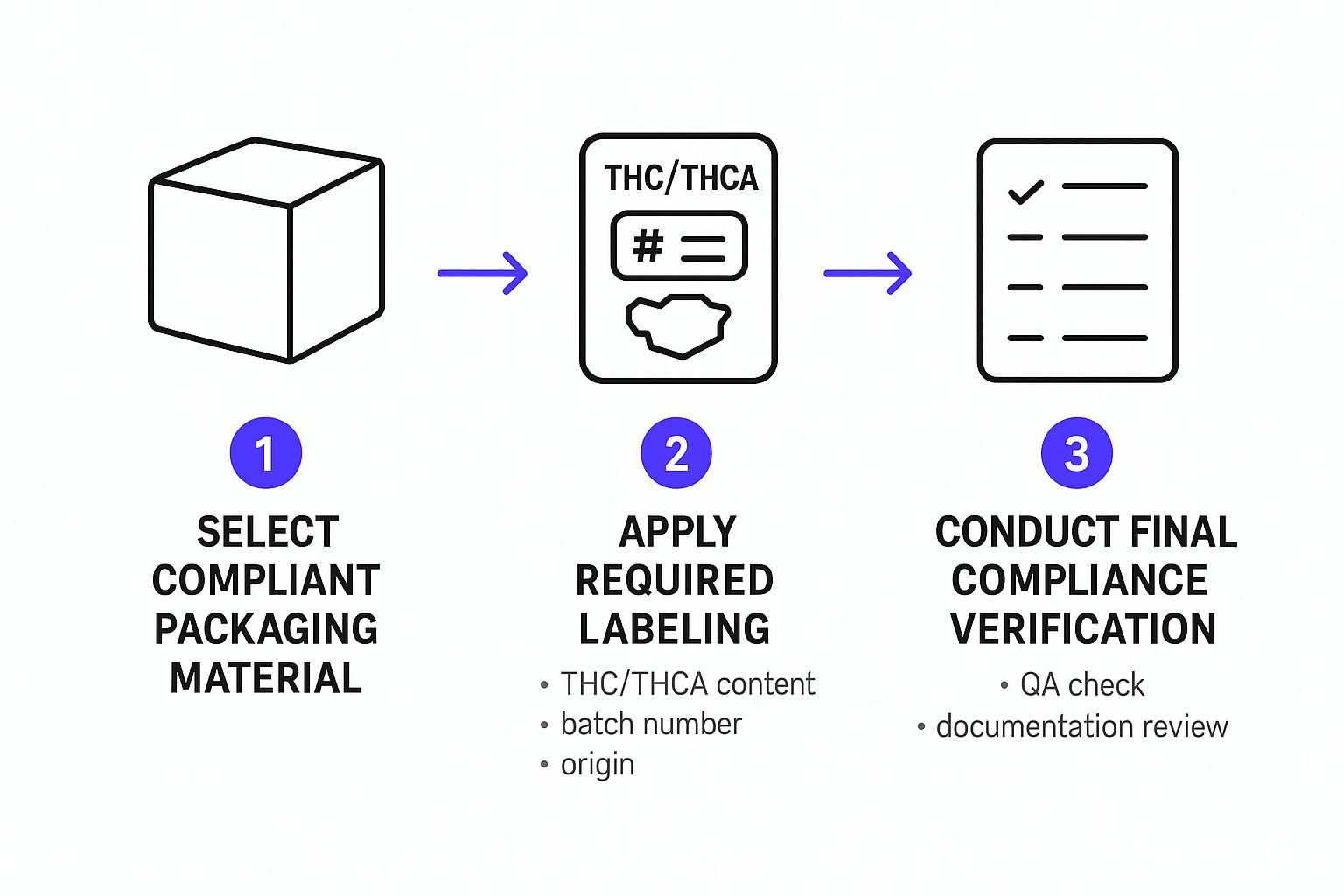
As you can see, compliance is a step-by-step process. It moves from material selection all the way to final verification, and there are no shortcuts.
Shipping From California (Interstate Outbound)
When you ship from California to other states, your compliance workload doubles. You have to follow California's outbound rules and the laws of the destination state. Never assume that just because a product is legal here, it’s legal everywhere else.
Take Idaho, for example. They have a zero-tolerance policy for any amount of THC. That means even some broad-spectrum CBD products that are perfectly legal in California are illegal there. Shipping a compliant California product into a stricter state can land both your business and your customer in legal hot water.
To build a solid foundation for your shipping operations, no matter the product, it helps to understand general ecommerce shipping best practices. This gives you a strong operational framework to build your specialized compliance protocols on top of.
Ultimately, successful shipping comes down to a deep understanding of these distinct channels. Whether you’re moving goods B2B or D2C, into California or out of it, treat every single shipment as a unique compliance challenge that requires careful verification and solid documentation.
Your Guide to Compliant Packaging and Labeling
In California, what’s on the outside of your hemp product is just as important as what’s inside. Think of your packaging and labeling not as marketing fluff, but as your first and most critical line of defense. Get it right, and your products move smoothly. Get it wrong, and you’re looking at seizures, fines, and a regulatory nightmare.
This isn’t the place to guess or cut corners. California’s rules are notoriously precise, and regulators view a sloppy label as a serious red flag. Your packaging has a dual role: it must be perfectly compliant to satisfy state inspectors while being transparent enough to build trust with your customers.
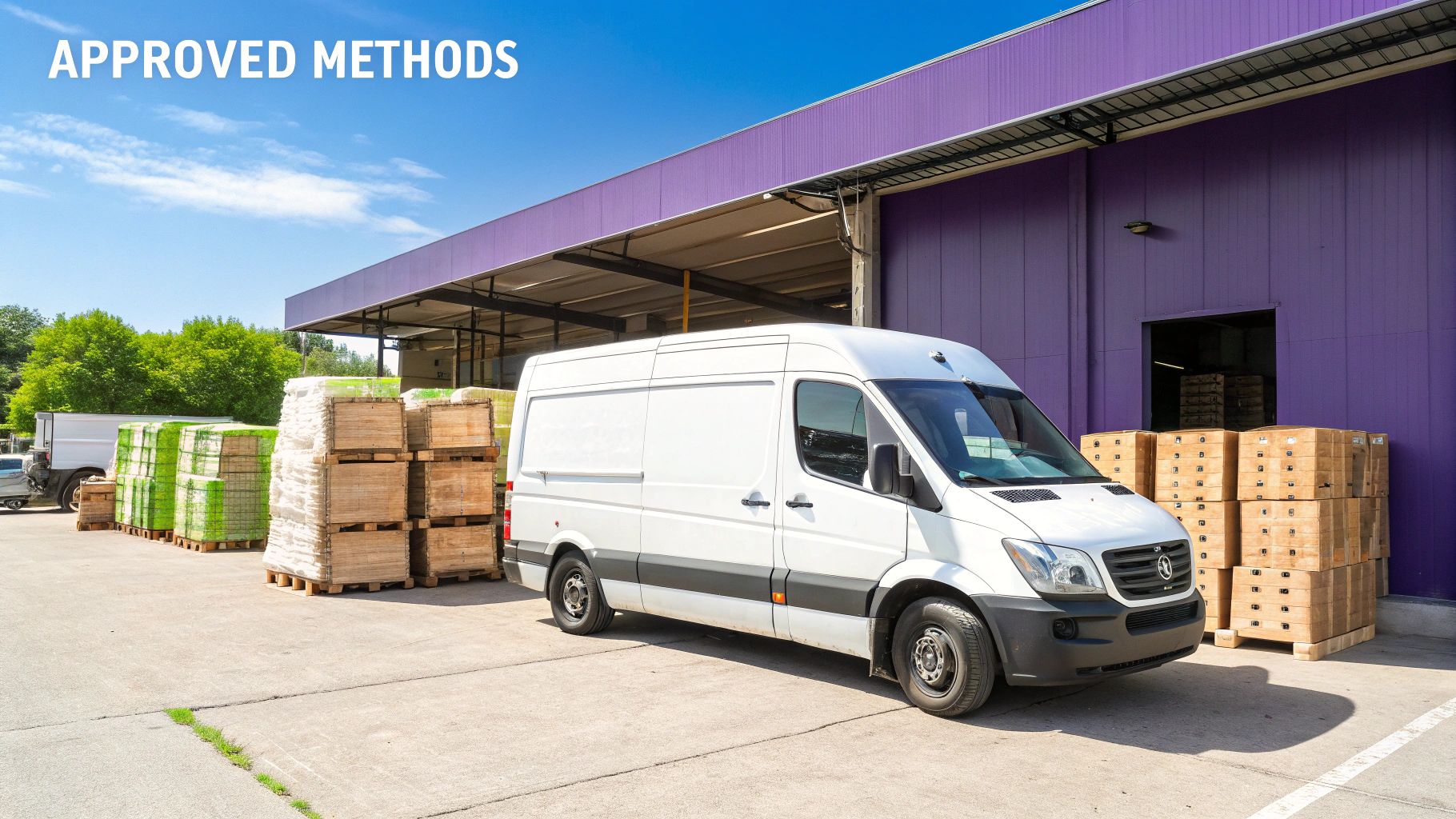
Decoding California's Labeling Mandates
When you're prepping products for the Golden State, there are several non-negotiable pieces of information that must be on every single package. Each one serves a purpose, from ensuring consumer safety to allowing for complete regulatory traceability.
A compliant label tells the whole story of the product, from the farm it came from to the shelf it sits on.
At a minimum, your label has to feature these essentials:
- Product Identity: Say exactly what it is (e.g., "Hemp Extract Tincture," "CBD Topical Salve"). Ambiguous names like "Chill Drops" won't cut it.
- Net Weight or Volume: List the exact amount of product in the container, using standard units.
- Manufacturer Information: The name and address of the licensed manufacturer must be clearly visible. This establishes a clear chain of accountability.
- Source of Hemp: You have to identify the state or country where the industrial hemp was grown.
These are just the basics. To be fully compliant, you need to get much more granular, especially when it comes to the lab results.
The Certificate of Analysis: Your Golden Ticket
If there’s one document that matters more than any other, it’s the Certificate of Analysis (COA). This isn't just paperwork; it's your undisputed proof, issued by an accredited third-party lab, that your product is legal and safe. It's your shield.
A California-compliant COA has to verify a few critical things, but nothing is more important than the total THC content. The report must show, without a shadow of a doubt, that the product is non-intoxicating under the state's strict definition.
A COA is your product’s passport. Without it, your shipment is going nowhere. In California, this means providing easy access to a full-panel lab report that confirms purity and legal cannabinoid levels.
The best practice—which is quickly becoming a hard requirement—is making the COA instantly available. The easiest and most effective way to do this is with a QR code printed right on the label. A quick scan should take anyone, from a customer to a regulator, directly to the full lab report for that specific batch.
This simple step accomplishes two massive goals: it satisfies legal requirements and builds incredible consumer confidence. You’re showing them you have nothing to hide.
Finalizing Your Seizure-Proof Label
To lock in your compliance, a few more details are required. These final elements are often where businesses make small but expensive mistakes.
A great label is your first line of defense. Here's a quick checklist to help you verify that your hemp product labels meet California's stringent requirements before you ship.
| California Hemp Product Labeling Checklist | ||
|---|---|---|
| Labeling Element | Requirement Details | Common Mistake to Avoid |
| Product Identity | A clear, common name for the product (e.g., "Hemp Oil Tincture"). | Using vague or unapproved marketing terms instead of a standard identity. |
| Cannabinoid Content | Total CBD and other cannabinoids listed in milligrams (mg) per serving and per package. | Listing only percentages or failing to provide both per-serving and per-package amounts. |
| Net Quantity | The net weight or volume of the contents in both imperial and metric units. | Forgetting to include both measurement systems or using inaccurate fill volumes. |
| Manufacturer Info | Name and address of the licensed manufacturer or distributor. | Using a PO box instead of a physical address or omitting the company name. |
| Ingredient List | A complete list of all ingredients in descending order of predominance by weight. | Forgetting to list sub-ingredients (e.g., ingredients within a flavoring). |
| Source of Hemp | The state or country where the industrial hemp was cultivated. | Leaving this information off entirely. |
| Batch/Lot Number | A unique code that identifies the specific production batch. | Using the same batch number across different production runs. |
| QR Code to COA | A scannable code linking directly to the third-party Certificate of Analysis. | Linking to a homepage or a non-specific lab results page instead of the exact batch COA. |
| Mandatory Warnings | Required statements (e.g., for pregnancy, operating machinery). | Using outdated warning language or placing it in an inconspicuous location. |
By treating this checklist as a final pre-flight inspection, you ensure every package is ready for the California market. These details protect your business and build the kind of trust that keeps customers coming back in the competitive world of CBD/Hemp/THCA shipping laws in California.
Where the Rubber Meets the Road: Getting a Carrier to Actually Ship Your Products
<iframe width="100%" style="aspect-ratio: 16 / 9;" src="https://www.youtube.com/embed/FQK89wyTm6s" frameborder="0" allow="autoplay; encrypted-media" allowfullscreen></iframe>Even if your CBD or hemp product is perfectly legal under California's maze of laws, you've still got one huge hurdle left: will anyone actually ship it for you?
Just because you can legally mail something doesn't mean a private company must accept it. The policies of major carriers like USPS, UPS, and FedEx are the final gatekeepers, and honestly, their rules can be even tougher than the law itself. Getting a handle on these carrier-specific policies is a critical piece of the puzzle for mastering CBD/Hemp/THCA shipping laws in California.
The USPS Stance: Sticking to the Federal Script
The United States Postal Service (USPS) pretty much sticks to federal law. Since the 2018 Farm Bill made hemp (containing less than 0.3% Delta-9 THC) legal, the USPS will transport compliant products. The catch? They don't just take your word for it.
When you ship with USPS, you are essentially self-certifying that your package is legal to mail. This means you better have all your paperwork in order and ready to go at a moment's notice.
If a postal inspector ever flags your package, you need to be able to immediately produce:
- A license from the state's department of agriculture showing the producer is authorized to grow hemp.
- A full-panel, third-party Certificate of Analysis (COA) proving the Delta-9 THC concentration is 0.3% or less.
This is where that whole federal vs. California conflict pops up again. While USPS is focused on the federal Delta-9 limit, you’re still breaking the law if you ship a product into California that violates the state's more restrictive "total THC" rule. The responsibility for meeting state-level laws falls squarely on you, the shipper.
Private Carriers: The Wild West of Internal Rules
Unlike the post office, private carriers like UPS and FedEx don’t have to ship your stuff. They’re private companies that set their own terms, and they tend to be far more cautious—and often maddeningly vague—when it comes to anything hemp-related.
These guys can refuse to ship any item they consider high-risk, regardless of whether it’s legal or not. Their main goal is to avoid getting tangled up with controlled substances, and all the gray areas around hemp make them incredibly nervous.
For private carriers, legality is just the starting point. Their internal risk policies are the final word. A product can be 100% legal, but if it spooks them or violates their terms of service, they can refuse, seize, or even destroy it without giving you a refund.
That means you have to dig into the most current terms of service for any private carrier you plan on using. These policies can change overnight. A "don't ask, don't tell" strategy is just asking for trouble and is a fast track to losing your shipping account and your products.
Your Secret Weapon: The Bulletproof Compliance Packet
So, what’s the best way to navigate this? Be ridiculously transparent. Don't wait for them to get suspicious and ask for proof; give it to them right from the start. Assembling a "compliance packet" to stick inside every single shipment is a simple but incredibly powerful move.
Think of this packet as your product's legal passport. It tells anyone who handles it that you're a legitimate, compliant business.
Your compliance packet should always have these three things:
- A Simple Cover Letter: A short note explaining that the package contains legal, compliant hemp products. No need for a novel, just the facts.
- The Certificate of Analysis (COA): A printed copy of the full-panel lab report for the exact batch you're shipping. I recommend taking a highlighter to the THC content section to make it impossible to miss.
- The Producer's License: A copy of the license from the hemp producer's state agricultural department.
By putting this paperwork right in the box, you answer any questions a carrier employee or inspector might have before they even ask. It screams professionalism and can save you from a world of delays, seizures, and headaches. It’s a small step that makes a huge difference.
The Real Costs of Getting It Wrong
Knowing the rules for CBD/Hemp/THCA shipping laws in California is only half the battle. What really separates successful businesses from cautionary tales is a deep respect for the consequences of breaking them. A seemingly minor mistake—like sending a federally legal but state-illegal THCA product—can unleash a devastating chain reaction of penalties.
Don't fool yourself: the California Department of Public Health (CDPH) and other state agencies aren't messing around. Enforcement isn't just a possibility; it's a certainty for any business that decides to cut corners. These penalties are designed to sting, creating a high-stakes environment where a regulation-first approach is the only way to survive.
Violating these laws isn't just a slap on the wrist. The fallout can be financially crippling and legally catastrophic for your entire operation, no matter how big or small.
From Warning Letters to Criminal Charges
California authorities scale their enforcement actions based on the severity of the violation. A simple labeling error might just get you a warning letter. But if you're caught with repeat offenses or are knowingly shipping intoxicating products, expect the hammer to fall much, much harder.
The penalties can stack up quickly and often include:
- Product Seizures: Entire shipments can be confiscated and destroyed on the spot. That’s a total loss of inventory and revenue, gone in an instant.
- Heavy Fines: We're not talking about parking tickets here. Financial penalties can climb into the thousands, or even tens of thousands, of dollars per violation. One mislabeled batch could sink your business.
- License Revocation: California can work with your home state to get your business licenses suspended or revoked, effectively shutting you down for good.
- Criminal Charges: In the most serious cases, like intentionally shipping large quantities of high-THC products disguised as legal hemp, business owners can find themselves facing criminal prosecution.
The most dangerous assumption you can make is that a "small" mistake will fly under the radar. Regulators are actively hunting for non-compliant products, and a single seized package is all it takes to trigger a full-blown investigation into your entire business.
The True Cost of Non-Compliance
The financial pain doesn't stop with fines and lost product. The long-term damage to your business's reputation can be far more expensive. Once you're flagged as a non-compliant shipper, carriers might refuse to work with you, and payment processors could shut down your account overnight.
Trying to rebuild that trust is a long, expensive, and often impossible road. To get a clearer picture of these risks, you should check out our guide on the true cost of shipping compliance violations, which breaks down all the hidden fees and consequences.
At the end of the day, investing in a meticulous compliance workflow is infinitely cheaper than paying the price for getting it wrong.
California Hemp Shipping FAQs
Getting a handle on California's hemp shipping rules can feel like trying to nail Jell-O to a wall. Let's clear up some of the most common questions we hear from businesses and consumers.
Can I Legally Ship THCA Flower to a Customer in California?
No, you absolutely cannot ship THCA flower directly to a retail customer in California. The state is very clear on this. California law lumps THCA into its "total THC" calculation, which means that high-THCA flower is legally considered an intoxicating cannabis product.
As a result, its sale and delivery are restricted to the state's licensed cannabis dispensary system, just like traditional marijuana. Trying to ship it directly is a fast track to trouble.
Do I Need a Special License to Ship CBD Into California?
There isn't a specific "hemp shipping license" you can apply for in California. Instead, the burden of proof is entirely on you, the shipper. Your business must be properly licensed in its home state, and your products must be fully compliant with California’s tough standards for non-intoxicating hemp.
This boils down to meeting the state's total THC limits and having your labeling buttoned up.
The single most important document you'll need is a full-panel Certificate of Analysis (COA) from an accredited third-party lab. Think of it as your product's passport. In California, it's non-negotiable proof that your product's "total THC" is within the legal limit and safe for sale.
Trying to keep all these rules straight by hand is a huge gamble for any business. Ship Restrict takes the guesswork out of it by letting you set up shipping rules by state, county, or even down to the ZIP code. You'll never have to worry about making a costly compliance mistake again.
Protect your business and automate your shipping compliance by visiting https://shiprestrict.com.

Cody Yurk
Founder and Lead Developer of ShipRestrict, helping e-commerce businesses navigate complex shipping regulations for regulated products. Ecommerce store owner turned developer.